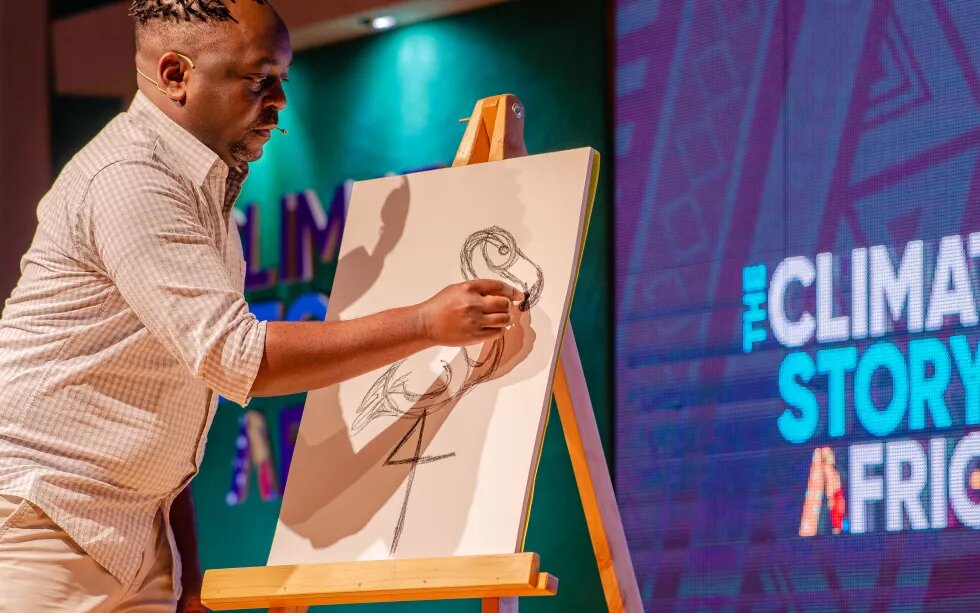Climate Story Lab Africa reconvenes for the second time in Africa this September 29th to amplify the visibility of African perspectives, experiences, and solutions on pressing climate issues to global audiences and policymakers, through compelling works of storytelling.

Climate Story Lab Africa reconvenes for the second time in Africa this September 29th to amplify the visibility of African perspectives, experiences, and solutions on pressing climate issues to global audiences and policymakers, through compelling works of storytelling.
The one-day hybrid event continuously interrogates the theme ‘What is the Africa Climate Justice Narrative?’, by bringing together, climate leaders, communities at the frontline of climate social innovators, journalists, creatives, and storytellers from across Africa who are working on people-centered and community-led innovations on the green economy at scale.
In partnership with Docubox East Africa Documentary Film Fund, Climate Story Lab is supported by Climate Justice Resilience Fund, Doc Society, and Heinrich boll Stiftung Nairobi. The 2022 Climate Story Lab Africa is steeped in the practice of advancing a climate-just future through transformative storytelling, to drive action and policies that reflect the climate realities in Africa.
“Africa is indeed a victim of climate change, but it is not the only narrative. Our stories also reflect our ingenuity, solutions, resource-rich continent, and resilience from our lived experience, especially in our communities at the front lines of climate change. As part of Doc Society’s Climate Story Labs global, we are inspired by the need to reflect this biodiversity in storytelling that is rooted in climate justice,” says Emily Wanja, Global Community Manager, Climate Story Unit at Doc Society.
Climate Story Lab Africa 2022 edition brings co-curated sessions with partners on climate justice panels and powerful storytelling projects being made right now on the continent in collaboration with affected communities, ranging from podcasts to documentaries to board games and Fashion installations showcasing climate-conscious engagement.
Africa is potentially the strongest liberator of the world in a climate crisis right now. With the largest young population on earth, the continent has the ancestral knowledge, the workforce, and the energy to solve the world's biggest problem in this case the climate crisis and this remains the defining undercurrent of the convening.
The climate leadership session will seek to define the brand of leaders that we need and must become to transition the continent to an equitable green future. While the energy justice for who? session will unpack Africa as the potential vanguard of the world's climate crisis while being real to our internal weaknesses such as inclusivity, tech and finance. The Doers and the dreamers’ session will host a conversation by bright young Africans, spearheading community-led innovations at scale.
“We are extremely happy to be part of the 2022 edition. As an organization that supports filmmakers in Africa to tell impact stories in their communities, we believe such conversations on climate justice and actions in Africa are a very crucial part of providing solutions and knowledge,” said Peter Mudamba, Programs Manager, Docubox East African Film Fund.
Climate Story Lab Africa seeks to move past the monoculture of traditional climate narratives by fostering the creation of compelling stories to shift narratives and accelerate change. Part of its efforts involves bringing together members of civil society and government agencies, including policymakers, academia, and scientists to re-imagine radical collaboration with creatives and storytellers that drives public action.
“We believe the climate conversation urgently requires cultural intervention by storytellers for an impactful narrative shift,” added Wanja.
“Heinrich boll Stiftung Nairobi is happy to be part of Climate Story Lab Africa 2022, for the second time. Climate justice should be part of the discussion at Climate Story Lab Africa this year because some of the unsustainable energy projects are the biggest contributor to climate change” concluded Fredrick Njau, Sustainable Development, Programme Coordinator, Heinrich boll Stiftung.